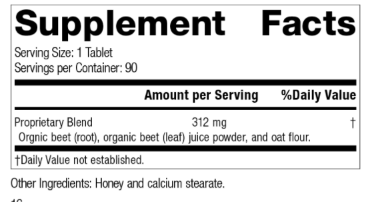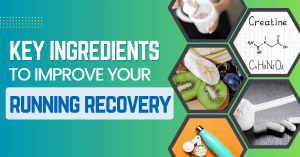If you’re like me and you love reading and watching everything you can when it comes to running and fitness, you can’t help but be bombarded by advertisements for all kinds of different supplements.
It’s not surprising then to be confused or skeptical about what works, what doesn’t and how to be able to tell for yourself what’s effective.
That’s why in this article I am going to break down the three most important things you want to look into when deciding to purchase a supplement and also what to watch out for and avoid.
How to Find Supplements That Work
Researched Ingredients
The first thing you’re going to want to do is make sure the ingredients in the product actually have some scientific evidence to back them up.
Luckily, that’s easier than ever these days with sites like Examine.com. Examine rounds up all the available studies on a particular ingredient and summarizes its effectiveness.
No opinion, no hype, just the research.
What I like most is they present the findings in what they call a “Human Effect Matrix”, which outlines supposed benefits and then the strength of evidence and magnitude of impact based on all the research studies available.
Most of their site is free to use, although they do have more in-depth paid programs as well if you really want to dig into the research.
Just search the ingredient you’re looking for and you’ve got an in-depth snapshot of the literature.
Now you have a quick and easy way to determine if the ingredients within the supplement will actually work.
This is actually the first step we take when a supplement company wants to advertise on our podcast. We get a list of ingredients and then run each one through the Examine database to see if actual scientific studies support the claims.
Proper dosages
Now that you’ve determined the ingredients in the supplement will work, you want to double check that they are dosed effectively.
One way cheap supplement companies try to save money is by including effective ingredients, but not at the properly dosed levels.
You can have the kitchen sink of effective ingredients, but if they are not dosed properly than you’re not going to get any benefit.
A great example of this is beet root juice.
There’s a decent amount of research that beet root juice can improve running performance, but the studies indicate that the minimum effective dose is 500mg of nitrate (the actual effective ingredient) with the best results being shown around the 1-2 gram dosage level.
Take a look at many of the popular beet root juice powders and shots. How many are dosed over 500mg? Very few that I could find.
This is where the research from the first step comes in handy.
Research studies will include effective dosages. Examine has a “how to take” section that lists the most common studies dosages, recommends an effective range, and lets you know if there are any outliers or dangers in taking too much.
Again, this is something we do for any supplement we recommend at RunnersConnect (and that I take personally).
I remember going through this process when looking for a greens supplement and why I eventually decided on Athletic Greens (AG 1).
I found a ton of options, but when I researched the ingredients and dosages in each product, I found that while many greens supplements advertised numerous ingredients, most were dosed far under the scientifically recommended amounts.
It’s easy to sprinkle in minor amounts of ingredients to inflate the label and make a product look more effective than it is.
That’s why paying attention to dosages is important.
Third Party Testing
Because supplements aren’t regulated by the FDA, there’s not a lot of oversight or exacting requirements when it comes to manufacturing, labeling or marketing.
That’s where third-party testing can come in handy. Third-party testing is an independent and impartial review of the supplement to ensure that…
- The supplement contains what’s stated on the label and in the amounts listed
- Products are standardized from batch to batch.
- The supplement is free of harmful levels of contaminants or other potential drug contaminants.
- The product doesn’t contain any undeclared ingredients.
Unfortunately, third-party testing is not required by law.
However, because it’s voluntary, it can be a quick way to know if a supplement company is doing everything it can to be transparent and provide the best possible product.
Some of the most popular third-party certifications are NSF, USP, Banned Substances Control Group (BSCG), or ConsumerLab.
NSF Certified for Sport is especially helpful for runners because this certification ensures that the product is free of more than 270 substances that are banned or prohibited by most major sports organizations.
So, if you’ve found two or three supplements that meet your requirements from steps one and two, you can use third-party testing as the final step to help you determine which is best.
Things to Avoid With Supplements
Proprietary blends
In marketing speak, a proprietary blend is a way for a company to claim that its exact combination and dosage of ingredients is so secretive that it can’t be disclosed.
In practical terms it’s a way to add lots of filler ingredients and hide the exact dosages they’re using so you can’t research if the product is effective or not.
Going back to our beet root juice example to illustrate.
We can easily see from research that 500mg of nitrate is the minimum dose. One way to hide not using an effective dose is by making it a proprietary blend, like this…

This is just a blend of a few different types of beets (and flour for some reason). But, we can’t tell how many mg of nitrate we’re going to get from this product. Run away.
A few “tips” for proprietary blends if you must use a supplement that has them.
- Ingredients do need to be listed in order of quantity (with highest amount being first). So, if you see the effective ingredient last on the list you can assume it’s trace amounts.
- Proprietary blends still have a total volume listed. In the case of the beet root above, the total is 312mg. That means there’s no way it has 500mg of nitrates if the total of all the proprietary ingredients is only 312mg.
Filler ingredients – stuff that doesn’t work, but is cheap
Along the same lines, many supplement companies will add lots of vitamins and minerals to the nutrition label in order to make it look more impressive.
Their rational is, the longer the nutrition label, the more impressive their product appears.
But, usually they are just filling the space with cheap vitamins and minerals you don’t really even need and likely don’t have an impact on the intended effect of the supplement you’re taking.
Examples include vitamin C, sodium, potassium, and calcium.
These are vitamins and minerals that are very cheap to add, so they fill the pill or scoop, but 95% of people don’t need to supplement.
Be wary of a supplement that seems to be stuffed with common vitamins and minerals (if that’s not the purpose of the supplement).
Cheap quality
You get what you pay for is a common saying and the adage applies to supplements as well.
Most of the effective ingredients in a supplement will cost the same amount for the manufacturer. This means the cost to make the supplement will be about the same for everyone.
Thus, any supplement that is considerably cheaper means…
- They aren’t using the correct dosages of the effective ingredients and using mostly fillers.
- They are using cheaper forms of the ingredients, which are often less effective.
- Or they are using some other method to lower the cost to produce the supplement (this is common with cheap protein powders where companies spike the product with nitrogen to make the protein content seem higher)
Now, there will always be some fluctuation or difference in price between brands as companies factor in marketing costs, negotiate deals from suppliers, or choose to operate with different margins.
However, be on the lookout if the supplement brand you’re looking at is 20% or more cheaper than the average or industry leader.
Self-published or funded research
One trend I’ve seen emerge in recent years is supplement claims using self-published research to support their claims.
In short, self-published research is a study that has not undergone the scrutiny and rigorous examination of the peer-review process required to be published in scientific journals or publications.
This peer review process ensures that study design is correct (appropriate sample sizes, properly randomized groups, effective variable control and more) and the conclusions match the data gathered.
Without this peer-review process, companies can use self-published studies to manipulate the study design to favor their supplement or make inferences from the data that aren’t actually supported.
This is a common practice with supplement companies making outrageous claims as mentioned previously.
When examining a potential supplement, take a look at the research studies they are citing to support their claims and make sure it was actually published in a scientific journal.
Your Takeaways
This may seem like a rigorous process to undertake on your own, but it really doesn’t take as long as you think when you have websites like Examine to rely upon. Plus, you only have to do it once.
Usually, researching a new supplement takes me 10-15 minutes. Most supplements I start research on are quickly thrown into the dud pile once I see that their ingredients don’t actually do what they say they do based on the research.
Then, if I do find something that looks promising, I spend another 15-30 minutes doing a deep-dive into the dosages, certifications, competitors, etc.
In my opinion, for something I am going to put into my body and likely going to spend a good amount of money on, I want to be sure it’s going to be effective.
I hope outlining our process when analyzing effective supplements helps you understand how to find effective supplements for your running and also how to avoid the marketing hype.








